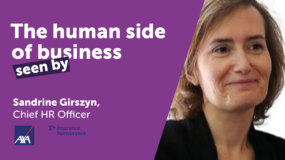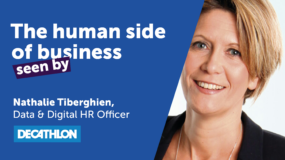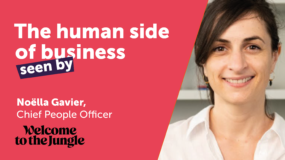Noëlla Gavier: “Enhancing the value of your HR function means enhancing the value of all your employees”
Here is our second edition of “The human side of business as seen by…”, a series of monthly interviews that gives a voice to those for whom resources are above all human. Whether they are HR, managers, business leaders or researchers, they all share with us their vision of the working world and its transformations.
We had the pleasure of interviewing Noëlla Gavier, Chief People Officer at Welcome to the Jungle. She tells us about her career in HR and shares her point of view on the evolution of the position and the human issues that companies are facing today.

Chief People Officer, Welcome to the Jungle
What is your relationship with HR and how did you become Chief People Officer at Welcome To The Jungle?
I started my career in recruitment. First in a recruitment agency, then internally at Vistaprint and Amazon. That’s where I learned to be a Recruiter: for 5 years I worked in an HR team and recruited for the French, Spanish and Italian entities.
I joined Mirakl in 2015 as Head of People. At the time it was a small start-up with around 30 employees, but was already growing rapidly. I was able to recruit and develop my team in France and Boston and we went from 30 to 350 employees in 5 years! In addition to the recruitment process, I also helped the company structure its teams, develop them and support their career paths. These are exciting subjects with high added value for working on talent retention within a company.
I joined Welcome to the Jungle last September as Chief People Officer. My position did not exist before I arrived, so there was a lot of work to do on the HR side, from selecting the right administrative tools to deploying the recruitment plan and structuring internal communication.
From your point of view, what human challenges do businesses face today? Is the human element sufficiently taken into account?
At Welcome to the Jungle, the well-being of our employees is at the heart of our HR policy. Our mission, which is to build a new experience at work, starts with us! That’s why we experiment a lot on issues such as the pace or the working environment for example. In concrete terms, we have introduced a four-day week to enable employees to achieve a better work/life balance and our Work From Home policy is very flexible.
In fact, this more humane vision of human resources is what appealed to me and made me want to join the company.
Today, and even more so in view of the current context in which we are evolving, it is imperative to put the human element at the centre of HR, to reassure employees and commit them in the long term. The company’s project and vision make it possible to check that everyone is well aligned!
This is what makes it possible today to strengthen the "partnership" between HR and its talents: we are moving from an HR function "at the service of" to an HR function "in collaboration with".
What is your vision of today’s HR?
I have always been lucky enough to work in companies where the HR function had its place on the Management Committee, in the same way as the Sales Department or the Finance Department. It is very important to have this place, because it reflects the People strategy of a company.
Valuing your HR function means valuing all your employees, and I find it hard to see it any other way.
The HR function is changing from an “administrative” function to a strategic function that accompanies change, supports managers, sets the course and supports the development of employees.
The complicated period we have just been through has highlighted the work done by the HR teams. Whereas HR is used to working behind the scenes with managers, it is now taking centre stage, speaking with employees on a daily basis to ensure their health and safety. This is what makes it possible today to strengthen the “partnership” between HR and its talents: we are moving from an HR function at the service of to an HR function in collaboration with.
What changes will the HR function undergo in the future and what skills it should develop tomorrow?
One of the future developments of the HR function will certainly concern the welcoming and support of remote employees. We will have to continue to create a vision and generate commitment remotely. At Welcome to the Jungle, for example, we have reviewed our entire onboarding process, which used to be based on in-room sessions. We have created videos in which each BU manager presents his or her job, as well as Q&A sessions so that new employees can maintain a real link with their colleagues and ask all their questions.
We will have to make effective use of all the levers and tech tools at our disposal to grow our culture, with asynchronous exchanges and new media, written or video.
The human challenge for the HR function will be to find talent in a much wider pool, no longer just local, but global.
In your opinion, what is the next major HR challenge?
I don’t think we’re going to go back to the way things were before.
We will go back to the office, of course, but we will be more flexible, with more mixed work patterns.
The crisis will reshape the geographical prism. The constraint of location will no longer exist, which will allow us to have access to talent almost everywhere. The human challenge for the HR function will be to find talent in a much wider pool, no longer just local, but global.
All this will shake up the office approach and it will be necessary at that point to succeed in bringing together dispersed teams and to ensure that a common sense is created.



